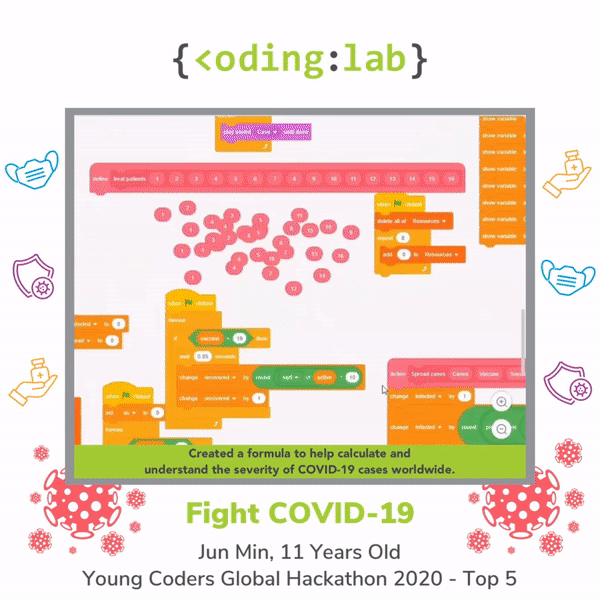A Peek Into Our Course: Young Computer Scientists (P11S) - Lifelong Learning and Real-World Impact
Our excited #CodingLabStudents and educator taking a photo together after creating an AR Photo Booth!
Step into a Young Computer Scientists (YCS) class at Coding Lab and you’ll find a room full of energy, imagination, and discovery. For our budding coders aged 7 to 9, every session is a hands-on adventure; whether they’re building a robot, designing a game, or solving a real-world problem through code.
What is the Young Computer Scientists (YCS) Programme?
Specially designed for ages 7–9, our multi-year, progression-based YCS curriculum introduces coding through Scratch and MIT RAISE Playground in a fun and structured way — and goes far beyond the basics.
Students explore 12 diverse research areas, ranging from:
Artificial Intelligence & Machine Learning (AIML)
Math, Physics and Biology Simulations
Movie Animation, Game Design, and Music Composition
Augmented Reality (AR), Robotics, and Micro:bit Projects
“My favourite modules are Mathematics and Physics. I love working with formulas and learning how to turn them into Scratch code!”
At Coding Lab, our Young Computer Scientists (ages 7–9) go on a structured, 180-hour journey with Scratch — a fun, powerful language for young minds. Through a deep, interdisciplinary curriculum spanning AI, math, science, design and more, students gain core computational thinking skills and learn to apply code meaningfully across real-world domains.
Through Cognitive Artificial Intelligence, we can make programs like Car Plate Reader for identity verification at places like school gates!
With advanced mathematical modelling, you can create simulations like this Covid-19 Simulator where you can simulate effects of good hygiene, etc.!
Why Focus on One Programming Language?
With so many coding platforms out there, it’s easy to jump from one to another — but at Coding Lab, we believe in depth over dabbling. Our students spend their foundational years mastering Scratch, using it to build apps, games, simulations and more.
It’s like learning to write a full essay in English rather than memorising one sentence in six languages. Mastery leads to real impact!
“YCS has made me more interested in coding. I’ve learnt to debug my programs and persevere. My favourite part was coding the mBot to follow the infinity line!”
Take Aidan and Evan, who began coding with us at age 7. With strong Scratch foundations, they went on to clinch Platinum and Gold Awards at the Hwa Chong Infocomm Challenge (HCIC), showcasing how depth builds excellence.
While other centres skim the surface across tools, our structured, age-appropriate pathway ensures students gain meaningful skills fast — by focusing on mastery before moving forward.
Computational Thinking, the Heart of Our Curriculum
Inspired by top global institutions like MIT and backed by education research, our curriculum takes its inspiration from Professor Jeanette Wing, a leader in Computer Science, who famously said:
“Computational thinking is a fundamental skill for everyone… It requires thinking at multiple levels of abstraction... It’s tomorrow’s reality.”
Each of our 12 research areas falls under three core themes:
Subject-Based Learning where students explore mathematics and science through simulations and games,
Applied Learning where students create projects in Artificial Intelligence, Augmented Reality, and multimedia storytelling., and
Hardware-Based Learning where students code robots and gadgets using Micro:bit and hands-on robotics
Students earn badges for each module and, after completing 6 to 8, gain balanced, hands-on experience across all themes. Using Scratch, they develop skills from game design to scientific modeling and explore complex topics like AI and environmental science!
Gamers out there can easily recreate their favourite games through Scratch, like this platformer game where our #CodingLabStudent has recreated the popular Geometry Dash game!
Any Potterheads out there? Make use of your coding knowledge along with knowledge of good animations to recreate scenes from your favourite TV shows and movies!
“I want to create projects about crises around the world. Through my programs, I hope to be able to do something for people that need help and raise awareness of their situation, as I believe this is something meaningful that I can do for others!”
Authentic Student Projects in Action
The YCS curriculum empowers students to explore their interests — from storytelling and science to sustainability and social impact — all through Scratch.
Whether recreating games like Geometry Dash, modelling physics with digital fidget spinners, or building AI-powered smart car parks, students turn ideas into real-world projects.
Take Jun Min, 11, who built a Covid-19 Simulation in Scratch using exponential growth models — proving that mastery in one language unlocks the power to express complex concepts creatively and meaningfully.
From Young Coders to Future Leaders
At Coding Lab, students don’t just learn to code — they build real-world skills for life. From AI sign language interpreters to games for social good and national awards, our students turn curiosity into impact. Starting with Scratch, they grow into confident thinkers and creators, ready for a lifelong journey of innovation and discovery.
Ready to Begin Your Child’s Coding Journey? At Coding Lab, we believe in nurturing deep thinkers and creators — not just coders. With our proven curriculum and passionate educators, your child will gain the confidence, skills, and mindset to thrive in a tech-driven world. Explore our Young Computer Scientists (YCS) programme here!





